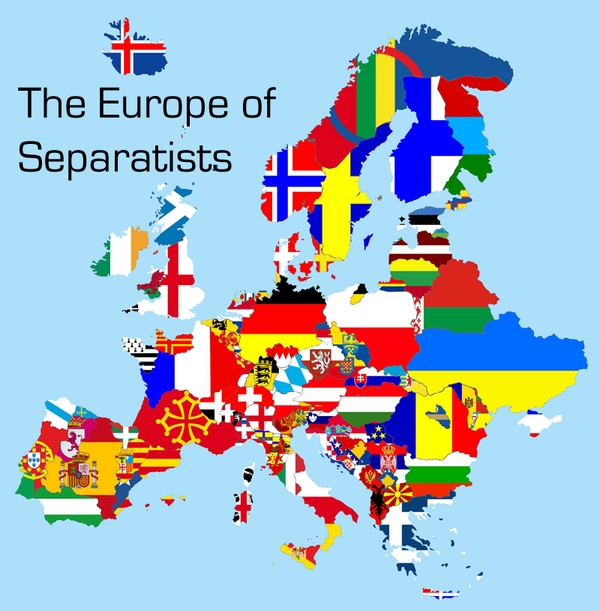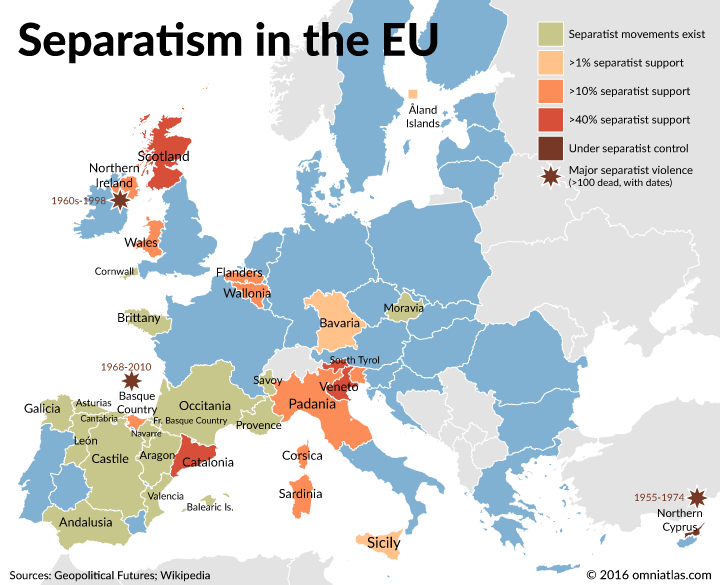
Views: 1681
Just three years after a citizens’ referendum returned Crimea to Russia, from which it had been separated for sixty years, the people of Catalonia, Spain’s largest province, will vote to leave that country.
And just as the international community has decreed that the Crimean referendum was a fake, Spain’s Prime Minister felt compelled to declare that the vote could’t possibly take place, that it would be illegal, that independence, in his words, could only be ‘a pipe dream’ for the country’s richest province.
Clearly, national governments don’t like losing land and people, however when it suits the international community, some communities are permitted to become independent. In 1999, after NATO destroyed Yugoslavia, whose constituent republics were inhabited mainly by diverse groups of Slavs, after a prolonged crisis that culminated in a referendum, the Albanian majority in Kosovo, which had been part of Serbia, was granted statehood.
Almost twenty years have passed since then, and the world is coming to a different frame of mind. Russia and China have become an item, leading other major non-western countries to form the BRICS, drawing Brazil, India and South Africa into an alliance that spans the globe, while local independence movements signal a move toward decentralization.
The European Union, about which much criticism is heard, pioneered the idea that problems should be solved at the lowest possible level, to which it gave the name of subsidiarity. This has encouraged unemployed college graduates across Europe to reinvent themselves in abandoned rural villages, creating cyber versions of sixties communes.
As citizens around the world invest themselves in politics close to home, they are increasingly aware that the big picture requires a different kind of leadership from the one that purports to represent the idea of democracy. Taking its cue from ancient Greek city-states, the Western world evolved into parliamentary systems that partly diluted the power of kings to make war on each other: those of ‘the people’ who had the means and could take time away from earning a living, ultimately got to sit in august chambers and argue over whose constituencies should be favored in any given issue, leaving the ‘silent’ majority to hope their ideas might prevail in a future ballot.
In recent years, electronic communication has enabled minority populations within nation-states to bring decision-making closer to home — but when even that failed to bring a fairer distribution of obligations and benefits, some decided they would be better served if they had power at their own ‘national’ level. Although not many leaders have recognized the inevitability of such an arrangement, the size of the two countries which together are challenging American hegemony, China and Russia, has made it inevitable that power vis a vis the outside world has accrued to ‘the top’, under what the US calls ‘authoritarian’ regimes.
What this means is that in an atomic age, matters of human survival are wisely left in the hands of unquestioned authority, rather than on the endless jockeying for power among interest groups in so-called representative democracies, whose major achievement has been to prevent wise kings from being followed by tyrants. The power of ‘authoritarian’ rulers is also renewed periodically by their citizens, while preserving the governing process from being watered down by ‘compromises that favor the demands of backers.
Turning now to Crimea, Kosovo and Catalonia, the Crimean referendum, long on its Russian population’s minds, became a matter of life or death when a Western managed coup brought anti-Russian Nazis to power in Ukraine, while the Kosovo referendum enabled Albanians, a non-Slav people whose language is unrelated to any other, to no longer be ruled by Slavs.
The Catalan case is different from that of both Albanians and Crimeans. The area known as Catalonia was long contested between France and Spain, and Catalonians, like most Europeans, have an acute sense of history, which contributes to their determination to achieve independence. Their language, Catalan is related to French, Spanish, Portuguese and Occitan, which was formerly spoken in southwestern France, Northwestern Italy and northern Spain, thus they see themselves as equal to these cousins who have long had states of their own. (Similarly the Corsicans sought independence from France after World War II, gradually obtaining greater autonomy. Like the Catalans, they have their own language, and an acute sense of history, aided by the fact that Napoleon was Corse.
If the Catalonian referendum returns a high percentage for succession, the chances of Scotland holding a second referendum will increase. The first one, held in 2014, elicited promises of greater autonomy from the then British Prime Minister, which were soon forgotten. With Great Britain exiting the European Union, Scotland is likely to again seek independence in order to remain in Europe.
As for the Kurds, a people spread over a contiguous area divided among four national states, Turkey, Syria, Iraq and Iran, they have gone about earning statehood by providing some of the best fighters in the war against terrorism — including female battalions, unhappily becoming part of the standoff between the US and Russia in the Middle East. They rule a significant area in Northern Iraq and have had a referendum of their own which, however, is not seen as the first step toward a state that would include the three other Kurdish areas, as both the host states as well as Russia and the US have reservations about the idea.
Finally, in recent times, several Americans states have birthed successionist movements, the farthest advanced being that of California, with the campaign called Calexit, and the most recent being that of Texas. At some point, the American press will discover that the founder of Calexit, Louis Marinelli, has been living in Russia for the past several years. Oblivious to the complementary roles played by ‘authoritarian’ governments cooperating at the international level, and decentralization, also known as local democracy, it will see this as proof that President Putin is trying to dismember the United States.
Originally published on 2017-09-26
About the author: Deena Stryker is an international expert, author and journalist that has been at the forefront of international politics for over thirty years, exclusively for the online journal “New Eastern Outlook”.
Source: New Eastern Outlook
Origins of images: Facebook, Twitter, Wikimedia, Wikipedia, Flickr, Google, Imageinjection, Public Domain & Pinterest.
Read our Disclaimer/Legal Statement!
Donate to Support Us
We would like to ask you to consider a small donation to help our team keep working. We accept no advertising and rely only on you, our readers, to keep us digging the truth on history, global politics and international relations.
[wpedon id=”4696″ align=”left”]
FOLLOW US ON OUR SOCIAL PLATFORMS








